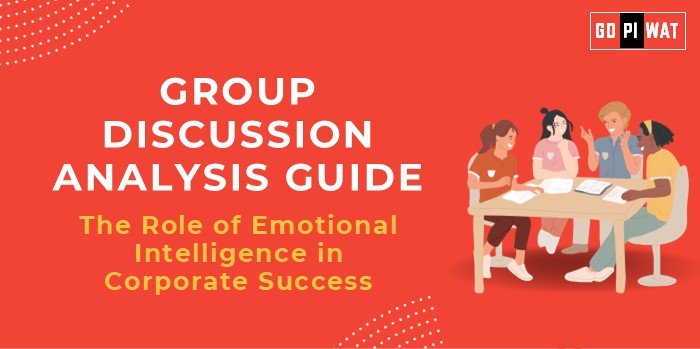📋 Group Discussion (GD) Analysis Guide: The Role of Emotional Intelligence in Corporate Success
🌐 Introduction to the Role of Emotional Intelligence
- Opening Context: Emotional intelligence (EI) is increasingly recognized as a cornerstone of leadership and teamwork in the corporate world. As workplaces become more diverse and dynamic, the ability to manage emotions effectively is a critical determinant of success.
- Topic Background: Coined by psychologists Peter Salovey and John Mayer in 1990 and popularized by Daniel Goleman, EI encompasses self-awareness, self-regulation, empathy, social skills, and motivation. Its role in organizational behavior, decision-making, and employee satisfaction has made it a key focus area for management professionals.
📊 Quick Facts and Key Statistics
- 📈 75% of Employers: Believe emotional intelligence is more important than IQ for leadership roles (LinkedIn Workforce Learning Report, 2023).
- 💼 90% of Top Performers: Score high on EI, underscoring its relevance in corporate success (TalentSmart, 2023).
- 📊 High ROI: Companies emphasizing EI training report a 20% increase in team productivity (Forbes, 2024).
- 🤝 Conflict Reduction: EI interventions reduce workplace conflicts by 30% (SHRM, 2023).
👥 Stakeholders and Their Roles
- 🏢 Corporate Leaders: Model EI in decision-making and conflict resolution.
- 📋 HR Departments: Facilitate EI-focused training and evaluations.
- 👩💼 Employees: Benefit from improved interpersonal dynamics and reduced stress.
- 🎓 Training Providers: Offer programs tailored to enhancing EI at various organizational levels.
🏆 Achievements and Challenges
✨ Achievements
- Enhanced Leadership Effectiveness: Managers with high EI demonstrate 60% better team engagement scores.
- Employee Retention: Workplaces with EI-centric cultures see 40% lower turnover rates.
- Conflict Resolution: Organizations adopting EI frameworks experience faster dispute resolutions.
- Customer Relations: Improved empathy skills boost client satisfaction metrics by 25%.
⚠️ Challenges
- Subjectivity in Assessment: Lack of standardized EI measurement tools.
- Cultural Barriers: Variations in emotional expression across global teams.
- Resistance to Training: Skepticism around the practicality of EI programs.
🌍 Global Comparisons
- US Tech Giants: Companies like Google and Microsoft embed EI in leadership training.
- Japanese Corporations: Use culturally adapted EI programs to strengthen workplace harmony.
📋 Case Study
- Infosys Leadership Development Program: Focused on integrating EI into leadership roles, resulting in a 15% increase in team productivity.
💡 Structured Arguments for Discussion
- Supporting Stance: “Emotional intelligence is indispensable in navigating the complexities of modern corporate environments.”
- Opposing Stance: “The emphasis on EI is overrated as hard skills remain the primary driver of success.”
- Balanced Perspective: “While EI is vital for leadership and interpersonal relationships, it must complement technical skills to maximize corporate outcomes.”
🔍 Effective Discussion Approaches
🌟 Opening Approaches
- Start with a statistic like, “90% of top performers possess high emotional intelligence.”
- Share a real-world example, such as Satya Nadella’s leadership at Microsoft emphasizing empathy.
💬 Counter-Argument Handling
- Rebut skepticism by citing studies linking EI training to tangible business outcomes.
- Address cultural nuances by suggesting localized training adaptations.
📈 Strategic Analysis of Strengths and Weaknesses
- Strengths: Enhances collaboration and communication. Reduces workplace conflicts.
- Weaknesses: Limited quantifiability and standardization.
- Opportunities: Growing demand for EI in hybrid workplaces.
- Threats: Resistance to change in traditional work environments.
📘 Connecting with B-School Applications
- Real-World Applications: EI’s role in stakeholder management, team dynamics, and leadership is crucial in MBA case studies and projects.
- Sample Interview Questions:
- “How can emotional intelligence improve team performance?”
- “Describe a situation where EI helped resolve a workplace conflict.”
- Insights for B-School Students:
- EI is essential for effective leadership.
- It complements analytical skills in problem-solving.


